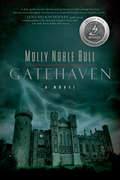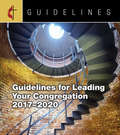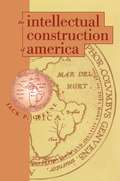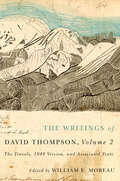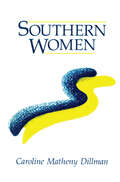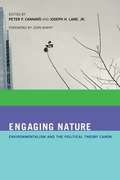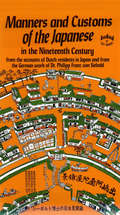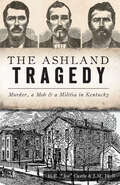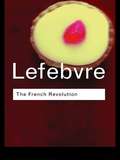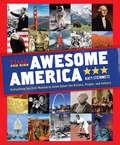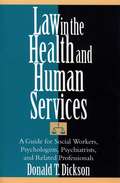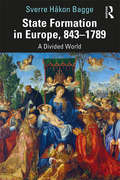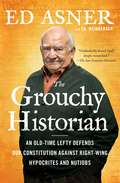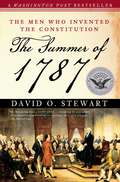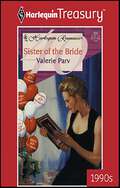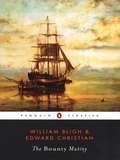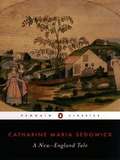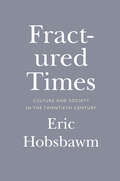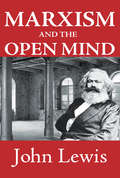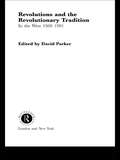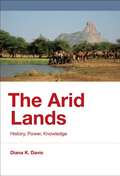- Table View
- List View
Gatehaven: A Novel
by Molly Noble BullGatehaven by Molly Noble Bull is a Christian Gothic historical novel set in a haunting mansion in the north of England where Ian Colquhoun and Shannon Aimee battle a Frenchman with dark secrets--spiritual warfare vs. the occult. Will they learn enough about God’s words to defend themselves and others or will evil overcome them? Gatehaven is the 2013 Creation House Fiction Writing Contest Winner.
Guidelines for Leading Your Congregation 2017-2020: For Each Ministry of Your Church
by General Board Of Discipleship"The local church is to minister to persons in the community where the church is located, to provide appropriate training and nurture to all, to cooperate in ministry with other local churches, to defend God's creation and live as an ecologically responsible community, and to participate in the worldwide mission of the church." — Book of Discipline 2012 ¶202 The twenty-six Guidelines for Leading Your Congregation 2017-2020, one for each ministry area, cover church leadership areas, as well as areas focused on nurture, outreach, and witness. The booklets are tools that get new lay leaders off to a good start and as a reference resource for all lay leaders. Each booklet includes the basic "job description" for the leader as well as practical "how-to" information important to implementing ministry effectively. Brief and to the point making it a perfect resource for the busy, but spirit-led leader. eBook Edition allows you download a digital file of all 26 Guidelines to your eReader for personal use. Include Guidelines included in Sets and sold separately are: Adult Ministries Advocates for Inclusiveness Children's Ministries Christian Education Church Council Church Historian Church & Society Communications Evangelism Family Ministries Finance Higher Education & Campus Ministry Lay Leader/Lay Member Men's Ministries Ministries With Young People Mission Nominations & Leadership Development Pastor Pastor-Parish Relations Scouting & Civil Youth-Serving Ministry Small Group Ministries Small Membership Church Stewardship Trustees Women's Ministries Worship
The Intellectual Construction of America
by Jack P. GreeneJack Greene explores the changing definitions of America from the time of Europe's first contact with the New World through the establishment of the American republic. Challenging historians who have argued that colonial American societies differed little from those of early modern Europe, he shows that virtually all contemporary observers emphasized the distinctiveness of the new worlds being created in America. Rarely considering the high costs paid by Amerindians and Africans in the construction of those worlds, they cited the British North American colonies as evidence that America was for free people a place of exceptional opportunities for individual betterment and was therefore fundamentally different from the Old World. Greene suggests that this concept of American societies as exceptional was a central component in their emerging identity. The success of the American Revolution helped subordinate Americans' long-standing sense of cultural inferiority to a more positive sense of collective self that sharpened and intensified the concept of American exceptionalism.
The Writings of David Thompson, Volume 2
by William E. MoreauDavid Thompson's Travels is one of the finest early expressions of the Canadian experience. The work is not only the account of a remarkable life in the fur trade but an extended meditation on the land and Native peoples of western North America. The second in a planned three volumes of Thompson's writings, this edition completes the great surveyor and fur trader's spirited autobiographical narrative. In the 1848 Travels, Thompson describes his most enduring historical legacy - the extension of the fur trade across the Continental Divide between 1807 and 1812. During these years he established several Nor'wester trading posts, made contact with the tribal peoples of the Columbia Plateau, and tirelessly mapped the lands he traversed, all the time striving westward toward the Pacific. The tale culminates with Thompson's historic arrival at the mouth of the Columbia in July 1811. Like its companion Volume 1, this work presents an entirely new transcription by William Moreau of Thompson's manuscript, and is accompanied by an introductory essay placing the author in his historical and intellectual context. Extensive critical annotations, a biographical appendix, and historical and modern maps, make this the definitive collection of Thompson's works, and bring one of North America's most important travelers and surveyors to a new generation of readers.
Southern Women
by Caroline M. DillmanFirst published in 1988. Routledge is an imprint of Taylor & Francis, an informa company.
Engaging Nature
by Peter F. Cannavò John Barry Joseph H. Lane Jr.Contemporary environmental political theory considers the implications of the environmental crisis for such political concepts as rights, citizenship, justice, democracy, the state, race, class, and gender. As the field has matured, scholars have begun to explore connections between Green Theory and such canonical political thinkers as Plato, Machiavelli, Locke, and Marx. The essays in this volume put important figures from the political theory canon in dialogue with current environmental political theory. It is the first comprehensive volume to bring the insights of Green Theory to bear in reinterpreting these canonical theorists.Individual essays cover such classical figures in Western thought as Aristotle, Hume, Rousseau, Mill, and Burke, but they also depart from the traditional canon to consider Mary Wollstonecraft, W. E. B. Du Bois, Hannah Arendt, and Confucius. Engaging and accessible, the essays also offer original and innovative interpretations that often challenge standard readings of these thinkers. In examining and explicating how these great thinkers of the past viewed the natural world and our relationship with nature, the essays also illuminate our current environmental predicament.Essays onPlato Aristotle Niccolò Machiavelli Thomas Hobbes John Locke David Hume Jean-Jacques Rousseau Edmund Burke Mary Wollstonecraft John Stuart Mill Karl Marx W. E. B. Du Bois Martin Heidegger Hannah Arendt Confucius ContributorsSheryl D. Breen, W. Scott Cameron, Peter F. Cannavò, Joel Jay Kassiola, Joseph H. Lane Jr. Timothy W. Luke, John M. Meyer, Özgüç Orhan, Barbara K. Seeber, Francisco Seijo, Kimberly K. Smith, Piers H. G. Stephens, Zev Trachtenberg, Andrew Valls, Harlan Wilson
Manners and Customs of the Japanese in the Nineteenth Century
by Terence Barrow Philipp Franz von SieboldManners and Customs of the Japanese in the Nineteenth Century is a delightful account of the Japanese of Tokugawa Japan.This unique handbook of Japanese manners, customs, history, and singular happenings was published in New York in 1841. Based on the firsthand observations of Dr. Philipp Franz von Siebold of the Dutch trading port Deshima in the years 1823-29, as well as on Spanish, Portuguese, German, and English records of early Japan, it provided us with a very rare picture of what Japan was like in the final years of its feudal period.Dr. von Siebold, the chief contributor, was attached to the Deshima post as a medial adviser and traveled within Japan, befriending and teaching many Japanese who were later to distinguish themselves in Western scientific knowledge. An indiscretion in accepting a map of Japan brought about his banishment by the Edo government and forced return to his native Germany.No collection of books on Japan is complete without a copy of Manners and Customs of the Japanese. It is here reprinted in its entirety from the original edition. Long submerged and virtually forgotten after a century of neglect, it is now made available for a new generation of readers.
Manners and Customs of the Japanese in the Nineteenth Century
by Terence Barrow Philipp Franz von SieboldManners and Customs of the Japanese in the Nineteenth Century is a delightful account of the Japanese of Tokugawa Japan.This unique handbook of Japanese manners, customs, history, and singular happenings was published in New York in 1841. Based on the firsthand observations of Dr. Philipp Franz von Siebold of the Dutch trading port Deshima in the years 1823-29, as well as on Spanish, Portuguese, German, and English records of early Japan, it provided us with a very rare picture of what Japan was like in the final years of its feudal period.Dr. von Siebold, the chief contributor, was attached to the Deshima post as a medial adviser and traveled within Japan, befriending and teaching many Japanese who were later to distinguish themselves in Western scientific knowledge. An indiscretion in accepting a map of Japan brought about his banishment by the Edo government and forced return to his native Germany.No collection of books on Japan is complete without a copy of Manners and Customs of the Japanese. It is here reprinted in its entirety from the original edition. Long submerged and virtually forgotten after a century of neglect, it is now made available for a new generation of readers.
Manners and Customs of the Japanese in the Nineteenth Century
by Terence Barrow Philipp Franz von SieboldManners and Customs of the Japanese in the Nineteenth Century is a delightful account of the Japanese of Tokugawa Japan.This unique handbook of Japanese manners, customs, history, and singular happenings was published in New York in 1841. Based on the firsthand observations of Dr. Philipp Franz von Siebold of the Dutch trading port Deshima in the years 1823-29, as well as on Spanish, Portuguese, German, and English records of early Japan, it provided us with a very rare picture of what Japan was like in the final years of its feudal period.Dr. von Siebold, the chief contributor, was attached to the Deshima post as a medial adviser and traveled within Japan, befriending and teaching many Japanese who were later to distinguish themselves in Western scientific knowledge. An indiscretion in accepting a map of Japan brought about his banishment by the Edo government and forced return to his native Germany.No collection of books on Japan is complete without a copy of Manners and Customs of the Japanese. It is here reprinted in its entirety from the original edition. Long submerged and virtually forgotten after a century of neglect, it is now made available for a new generation of readers.
The Ashland Tragedy: Murder, Mob & a Militia in Kentucky (True Crime)
by E. Joe CastleThis true crime history recounts the notorious nineteenth-century murder of three Kentucky children and the shocking aftermath once arrests were made. On Christmas Eve 1881, a horrible crime shook the small town of Ashland, Kentucky, and captivated the entire nation. Three children were brutally murdered and their house set ablaze. Nothing in the small town&’s past had prepared it for what followed. Three men were convicted of the crimes, and two were sentenced to death. But the murderers were protected by the governor&’s untrained militia, which would eventually turn their guns on Ashland&’s innocent citizens. Much of these events were recorded at the time by James Morgan Huff, founder of the Ashland Republican newspaper, in a booklet titled The Ashland Tragedy. Now author and Ashland native H.E. &“Joe&” Castle builds on Huff&’s work to reveal the full, true story of one of the darkest chapters in the history of Kentucky.
The French Revolution: From its Origins to 1793
by Georges LefebvreInternationally renowned as the greatest authority on the French Revolution, Georges Lefebvre combined impeccable scholarship with a lively writing style. His masterly overview of the history of the French Revolution has taken its rightful place as the definitive account. A vivid narrative of events in France and across Europe is combined with acute insights into the underlying forces that created the dynamics of the revolution, as well as the personalities responsible for day-to-day decisions during this momentous period.
Awesome America: Everything You Ever Wanted to Know About the History, People, and Culture
by The Editors of Time For KidsFor the first time ever, in a single indispensable reference volume, TIME For Kids Awesome America offers 8-12 year olds a fun, fact-filled, and photographic overview of the people, places, and events that have made America awesome. From America's early history all the way to present day, kids will learn about what it was like to grow up in the 1700's, 1800's, 1900's and today and will find out all about the inventions, innovations, and movements great American's have created over the years. Structured for both dip-in reference and longer-form reading, Awesome America is organized into 14 thematic sections, each comprised of bite-sized articles, engaging factoid sidebars, colorful charts, graphics and interactive quizzes for easy school report or homework helper reference.The 14 sections include: Our BeginningOur GovernmentOur PresidentsAll 50 States and MoreThe LandThe Great Melting PotMoments that Changed AmericaCivil Rights MovementsGreat AmericansGrowing Up in AmericaAmerica's Role in the WorldOur Home: Grown Gifts to the WorldOne-Of-A-Kind Experiences (only found on American soil)Year-By-Year A Timeline (comprehensive visual timeline pre-Columbus through the present)Plus, a complete Glossary and Index
Law in the Health and Human Services
by Donald T. DicksonProfessor Dickson provides students with examples of a legal way of thinking about significant issues in social policy. This book can be used in policy and practice courses in the fields of mental health, child welfare, the family, developmental and physical disabilities, and professional ethics. Provides excellent selection of relevant court decisions along with clearly articulated questions and issues for discussion.
State Formation in Europe, 843–1789: A Divided World
by Sverre BaggeState Formation in Europe, 843–1789 follows the formation and development of the European state from the division of the Carolingian Empire to the French Revolution. The book’s primary focus is on Europe’s patterns of internal and external development in comparison to political organization in other parts of the world. By analysing Europe as a single unit, rather than dividing it into nation states, it reveals the broader historical connections within the Continent. Bagge takes the reader through a discussion of how kingdoms evolved into states, introducing the influence of the Church and the town on these state structures. The relationship between state, Church and town is traced to explain how these different power struggles played out and why the territorial state became the dominate form of organization. Finally, the book clarifies why Europe developed in this way and the global consequences of this development. By observing Europe through the perspective of the rest of the world, readers gain insight into trends common to the whole Continent while crossing the traditional border between the Middle Ages and early modern period. This book is essential reading for students studying medieval and early modern political history, state formation and Europe in a global context.
The Grouchy Historian: An Old-Time Lefty Defends Our Constitution Against Right-Wing Hypocrites and Nutjobs
by Ed Asner Ed. WeinbergerIn the tradition of Al Franken and Michael Moore, Ed Asner—a.k.a. Lou Grant from The Mary Tyler Moore Show—reclaims the Constitution from the right-wingers who think that they and only they know how to interpret it.Ed Asner, a self-proclaimed dauntless Democrat from the old days, figured that if the right-wing wackos are wrong about voter fraud, Obama’s death panels, and climate change, they are probably just as wrong about what the Constitution says. There’s no way that two hundred-plus years later, the right-wing ideologues know how to interpret the Constitution. On their way home from Philadelphia the people who wrote it couldn’t agree on what it meant. What was the president’s job? Who knew? All they knew was that the president was going to be George Washington and as long as he was in charge, that was good enough. When Hamilton wanted to start a national bank, Madison told him that it was unconstitutional. Both men had been in the room when the Constitution was written. And now today there are politicians and judges who claim that they know the original meaning of the Constitution. Are you kidding? In The Grouchy Historian, Ed Asner leads the charge for liberals to reclaim the Constitution from the right-wingers who use it as their justification for doing whatever terrible thing they want to do, which is usually to comfort the comfortable and afflict the afflicted. It’s about time someone gave them hell and explained that progressives can read, too.
The Summer of 1787
by David O. StewartThe successful creation of the Constitution is a suspense story. The Summer of 1787 takes us into the sweltering room in which delegates struggled for four months to produce the flawed but enduring document that would define the nation -- then and now. George Washington presided, James Madison kept the notes, Benjamin Franklin offered wisdom and humor at crucial times. The Summer of 1787 traces the struggles within the Philadelphia Convention as the delegates hammered out the charter for the world's first constitutional democracy. Relying on the words of the delegates themselves to explore the Convention's sharp conflicts and hard bargaining, David O. Stewart lays out the passions and contradictions of the often painful process of writing the Constitution. It was a desperate balancing act. Revolutionary principles required that the people have power, but could the people be trusted? Would a stronger central government leave room for the states? Would the small states accept a Congress in which seats were alloted according to population rather than to each sovereign state? And what of slavery? The supercharged debates over America's original sin led to the most creative and most disappointing political deals of the Convention. The room was crowded with colorful and passionate characters, some known -- Alexander Hamilton, Gouverneur Morris, Edmund Randolph -- and others largely forgotten. At different points during that sultry summer, more than half of the delegates threatened to walk out, and some actually did, but Washington's quiet leadership and the delegates' inspired compromises held the Convention together. In a country continually arguing over the document's original intent, it is fascinating to watch these powerful characters struggle toward consensus -- often reluctantly -- to write a flawed but living and breathing document that could evolve with the nation.
The Summer of 1787
by David O. StewartThe Summer of 1787 takes us into the sweltering room in which the founding fathers struggled for four months to produce the Constitution: the flawed but enduring document that would define the nation--then and now.George Washington presided, James Madison kept the notes, Benjamin Franklin offered wisdom and humor at crucial times. The Summer of 1787 traces the struggles within the Philadelphia Convention as the delegates hammered out the charter for the world's first constitutional democracy. Relying on the words of the delegates themselves to explore the Convention's sharp conflicts and hard bargaining, David O. Stewart lays out the passions and contradictions of the, often, painful process of writing the Constitution. It was a desperate balancing act. Revolutionary principles required that the people have power, but could the people be trusted? Would a stronger central government leave room for the states? Would the small states accept a Congress in which seats were allotted according to population rather than to each sovereign state? And what of slavery? The supercharged debates over America's original sin led to the most creative and most disappointing political deals of the Convention. The room was crowded with colorful and passionate characters, some known--Alexander Hamilton, Gouverneur Morris, Edmund Randolph--and others largely forgotten. At different points during that sultry summer, more than half of the delegates threatened to walk out, and some actually did, but Washington's quiet leadership and the delegates' inspired compromises held the Convention together. In a country continually arguing over the document's original intent, it is fascinating to watch these powerful characters struggle toward consensus--often reluctantly--to write a flawed but living and breathing document that could evolve with the nation.
Sister of the Bride
by Valerie ParvDeception...or desire?Terise O'Neill has a goal-revenge for her stepsister Clair's unhappy marriage. She needs to get close to Ryan Westmore, and a job in his home-as nanny to his and Clair's twin girls-provides her with the ideal opportunity.Close proximity to Ryan, however, reveals a very different man from the one Clair had portrayed. With thoughts of revenge fast receding, Terise is faced with a new challenge. How will Ryan react when he hears about her deception?
The Bounty Mutiny
by William Bligh R. D. Madison Edward ChristianThe names William Bligh, Fletcher Christian, and the Bounty have excited the popular imagination for more than two hundred years. The story of this famous mutiny has many beginnings and many endings but they all intersect on an April morning in 1789 near the island known today as Tonga. That morning, William Bligh and eighteen surly seamen were expelled from the Bounty and began what would be the greatest open-boat voyage in history, sailing some 4,000 miles to safety in Timor. The mutineers led by Fletcher Christian sailed off into a mystery that has never been entirely resolved.While the full story of what drove the men to revolt or what really transpired during the struggle may never be known, Penguin Classics has brought together-for the first time in one volume-all the relevant texts and documents related to a drama that has fascinated generations. Here is the full text of Bligh's Narrative of the Mutiny, the minutes of the court proceedings gathered by Edward Christian in an effort to clear his brother's name, and the highly polemic correspondence between Bligh and Christian-all amplified by Robert Madison's illuminating Introduction and rich selection of subsequent Bounty narratives
A New-England Tale
by Catharine Maria Sedgwick Susan K. Harris Emily Van DetteJane Elton, orphaned as a young girl, goes to live with her aunt Mrs. Wilson, a selfish and overbearing woman who practices a repressive Calvinism. In their rural New England village, Jane grows up yearning to break free from Mrs. Wilson's tyranny and find her place as a citizen of the evolving American Republic. She is helped by her encounters with characters who embody various shadings of moral, religious, and civic virtue: the affectionate servant Mary Hull, a pious Methodist; Mr. Lloyd, a kind Quaker; Crazy Bet, emotional, sympathetic, but deeply unstable; and Old John, bereaved but wise. Ultimately, A New-England Tale is about the connection between parenting and governing, and the key role women play in shaping a fledgling nation.
Como un sueño en un sueño
by Mina VeraUna nueva visión del mundo de los vampiros que te hará replantearte todas las ideas preconcebidas que tenías sobre una leyenda que podría ser más real de lo que imaginas. Es el día de Carnaval y Abigail acude a una fiesta de disfraces, donde debe recoger a la niña a la que cuida por las tardes para poder pagarse la universidad. El destino quiere que confunda la dirección y acabe en una fiesta que no tiene nada de infantil. En un ambiente decimonónico, conocerá a Elías, el cautivador hijo del líder del clan vampírico de la margen izquierda de la ciudad de Bilbao, quien la confundirá con una mensajera del clan que controla la margen derecha. Elías le entregará una crucial carta que puede suponer bien una alianza entre clanes o bien la guerra. Tras ser extrañamente embrujada por Elías, será interceptada por los Conciliadores, una organización secreta cuyo objetivo es mantener controlados a los vampiros bajo sus leyes. Max,el líder de la Sede de la ciudad, será el encargado de protegerla. A pesar de que su relación comienza siendo poco amistosa, pronto surgirá una poderosa atracción entre ambos y descubrirán que han nacido el uno para el otro. Pero su amor se verá amenazado por Elías, dispuesto a lo que sea para lograr que Abigail sea para él. Atrapada entre dos mundos, entres dos amores, Abigail deberá encontrar su verdadera naturaleza en su interior y luchar para salvar la paz entre vampiros y humanos, además de su propia vida y la de aquel a quien su corazón ha elegido como compañero para la eternidad.
Fractured Times
by Eric HobsbawmEric Hobsbawm, who passed away in 2012, was one of the most brilliant and original historians of our age. Through his work, he observed the great twentieth-century confrontation between bourgeois fin de siècle culture and myriad new movements and ideologies, from communism and extreme nationalism to Dadaism to the emergence of information technology. In Fractured Times, Hobsbawm, with characteristic verve, unpacks a century of cultural fragmentation.Hobsbawm examines the conditions that both created the flowering of the belle époque and held the seeds of its disintegration: paternalistic capitalism, globalization, and the arrival of a mass consumer society. Passionate but never sentimental, he ranges freely across subjects as diverse as classical music, the fine arts, rock music, and sculpture. He records the passing of the golden age of the "free intellectual" and explores the lives of forgotten greats; analyzes the relationship between art and totalitarianism; and dissects phenomena as diverse as surrealism, art nouveau, the emancipation of women, and the myth of the American cowboy.Written with consummate imagination and skill, Fractured Times is the last book from one of our greatest modern-day thinkers.
Marxism and the Open Mind (Routledge Library Editions: Marxism Ser.)
by John LewisIn Marxism and the Open Mind, John Lewis seeks to explain Marxism as a system of thought. In doing so, he addresses the studied neglect or grotesque misrepresentation that he feels characterizes Western attitudes toward Marxism. Lewis also aims to stimulate what he believes to be a long overdue re-evaluation of Marxism in the light of what was contemporary thought in 1957, the year of the book's original publication and the height of the Cold War era.The essays include chapters on human rights and a discussion on Marxism and liberty. Marxist ethics, a much-neglected theme, is the subject of an essay that deals with some of the most deeply felt criticisms of Marxism in the 1950s. The ethical aspects of Marxism are examined once again in a contribution to the debate on Marxism and religion. The volume concludes with essays on Berdyaev and Sartre, which strike a note on the Marxist estimation of these thinkers, and with an essay on Marxist humanism.The essays cover a wide field of thought, uniting a close and sympathetic study of Marxism with a critical judgment rooted in academic training at three universities and experience in the Christian ministry.
Revolutions and the Revolutionary Tradition: In the West 1560-1991
by David ParkerRevolutions presents eight European case studies including the English revolution of 1649, the French Revolution and the recent revolutions within the Soviet Union and Eastern Europe (1989-1991) and examines them not only in their specific political, economic and social contexts but also as part of the wider European revolutionary tradition. A chapter on the American Revolution is also included as a revolution which grew out of European expansionism and political culture. Revolutions brings together leading writers on European history, who make a major contribution to the controversial debate on the role of revolution in the development of European history. This is a truly comparative book which includes discussion on each of the following key themes: * the causes of revolution, including the importance of political, social and economic factors * the effects of political and philisophical ideas or ideology on the revolution * the form and process of a revolution, including the importance of violence and popular support * the outcome of revolution, both short-term and long-term * the way revolution is viewed in history particularly since the collapse of Communism in Europe.
The Arid Lands: History, Power, Knowledge
by Diana K. DavisDeserts are commonly imagined as barren, defiled, worthless places, wastelands in need of development. This understanding has fueled extensive anti-desertification efforts -- a multimillion-dollar global campaign driven by perceptions of a looming crisis. In this book, Diana Davis argues that estimates of desertification have been significantly exaggerated and that deserts and drylands -- which constitute about 41% of the earth's landmass -- are actually resilient and biodiverse environments in which a great many indigenous people have long lived sustainably. Meanwhile, contemporary arid lands development programs and anti-desertification efforts have met with little success. As Davis explains, these environments are not governed by the equilibrium ecological dynamics that apply in most other regions. Davis shows that our notion of the arid lands as wastelands derives largely from politically motivated Anglo-European colonial assumptions that these regions had been laid waste by "traditional" uses of the land. Unfortunately, such assumptions still frequently inform policy. Drawing on political ecology and environmental history, Davis traces changes in our understanding of deserts, from the benign views of the classical era to Christian associations of the desert with sinful activities to later (neo)colonial assumptions of destruction. She further explains how our thinking about deserts is problematically related to our conceptions of forests and desiccation. Davis concludes that a new understanding of the arid lands as healthy, natural, but variable ecosystems that do not necessarily need improvement or development will facilitate a more sustainable future for the world's magnificent drylands.
